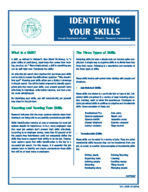IDENTIFYING
YOUR SKILLS
Georgia Department of Labor
Michael L. Thurmond, Commissioner
What is a Skill?
The Three Types of Skills
A skill, as defined in Webster's New World Dictionary, is "a great ability or proficiency, expertness that comes from training, practice, etc." More simply stated, a skill is something you can do well right now. Everybody has skills!
An effective job search plan requires that you know your skills and be able to answer the skills-driven question: "Why should I hire you?" Knowing your skills offers you a distinct advantage in the job search. You will be better prepared to identify appropriate jobs that match your skills, and, present yourself more effectively in interviews, write better resumes, and land a better, more satisfying job.
By identifying your skills, you will automatically put yourself way ahead in the job hunt.
Knowing and Naming Your Skills
Research indicates that the most common mistake when interviewing is not being able to successfully communicate job skills.
Skills identification remains an area of weakness for most job seekers despite its importance. In fact, many employers note that most job seekers don't present their skills effectively. According to an employer survey, more than 90 percent of all the people they interviewed could not adequately define the skills they have to support their ability to do the job. Employment experts agree that skills identification is the key to a successful job search. For this reason, it is essential that job seekers learn to identify and clearly communicate those skills that will be of most value to employers.
Analyzing skills for even a simple task can become quite complicated. A simple way to organize skills is to divide them into three basic types. Following is a description and examples of the three types of skills.
These skills involve self-control when dealing with people and situations.
Job-Related Skills
These skills are related to a particular job or type of job. Jobrelated skills are gained in a variety of ways including education, training, work or other life experiences. Employers require job-related skills in addition to adaptive and transferable skills. Some examples of these are:
Troubleshoot PCs Operate equipment Operate forklift Answer telephone Instruct students
Data entry Repair cars Assemble crates Operate computer Keep records
Transferable Skills
These skills can be useful in a variety of jobs. They are called transferable skills because they can be transferred from one job, or career, to another. Some examples of transferable skills are:
Writing clearly Organizing tasks Advising people Observing Developing plans
Training/Teaching Listening Handling money Filing records Managing people
continued
DOL-4435 (R-08/04)
Self-Management Skills
You use these skills every day to survive and get along. They allow you to adapt or adjust to a variety of situations and could be considered part of your basic personality. These skills are highly valued by employers and are often difficult for them to identify. Be prepared to offer examples to stress positive aspects of your personality. Some examples are:
Honesty Enthusiasm Dependability Responsible Dedicated
Adaptable Creative Energetic Sincere Conscientious
List and Prove Your Skills by Example
Make a list of your skills in each category; then select the top three from each.
Next, you must be able to offer concrete examples of how you demonstrated them "on the job." Try using the five steps below to construct your "proof by example."
1. Identify and name a skill 2. Present a concrete example (where and how you used it) 3. Qualify the example and describe the circumstances (who,
what, when, why, how?) 4. Reinforce with measurable data (numbers, dollars, savings,
profits) 5. Give results (How did the employer benefit from your ac-
tions?)
Practice presenting each example as if you are speaking to an employer. Sell your skills!
A Final Tip
The importance of matching your skills to emloyers' needs is key. The ability to identify, explain, and prove your skills can make the difference between getting the job or not. You must be able to showcase your product - You!
Visit our website at www.dol.state.ga.us
Equal Opportunity Employer/Program z Auxiliary Aids & Services Are Available Upon Request To Individuals With Disabilities
